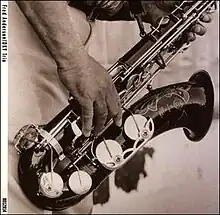Fred Anderson / DKV Trio
Fred Anderson / DKV Trio is an album by the American jazz saxophonist Fred Anderson with the DKV Trio, composed of drummer Hamid Drake, bassist Kent Kessler and reedist Ken Vandermark. The album was recorded in 1996 and released on Okka Disk. The DKV Trio formed in the summer of 1994 and started performing at Anderson's Velvet Lounge very early in their career. Those meetings led to the idea of doing a record with Fred.[1] "Black Woman", a classic Anderson composition that appears on several of his other recordings, is a tenor sax duet.[2]
| Fred Anderson / DKV Trio | ||||
|---|---|---|---|---|
 | ||||
| Studio album by | ||||
| Released | 1997 | |||
| Recorded | December 3, 1996 | |||
| Studio | Airwave, Chicago | |||
| Genre | Jazz | |||
| Length | 47:54 | |||
| Label | Okka Disk | |||
| Producer | Ken Vandermark , Bruno Johnson | |||
| Fred Anderson chronology | ||||
| ||||
| Ken Vandermark chronology | ||||
| ||||
Reception
| Review scores | |
|---|---|
| Source | Rating |
| AllMusic | |
| The Penguin Guide to Jazz | |
In her review for AllMusic, Joslyn Layne states that "Fred Anderson & DKV Trio cannot disappoint any free-jazz fan; with its lyrical beauty, passion, and warmth, it will convert many a jazz enthusiast who thinks 'free' means 'squalling.'"[3] The Penguin Guide to Jazz states: "The DKV Trio collaboration was an important turning point in perceptions of Fred Anderson's music, since these younger player were leading something of a charge in contemporary Chicagoan jazz."[4]
Track listing
- All compositions by Fred Anderson
- "Planet E" - 8:30
- "Aaron's Tune" - 5:55
- "Black Woman" - 6:09
- "Our Theme" - 5:56
- "Dark Day" - 10:54
- "Lady's in Love" - 10:30
Personnel
References
- Past Present: a partial history of the DKV Trio, 1994 to 2011 at Not Two
- Fred Anderson / DKV Trio at Okka Disk
- Layne, Joslyn. Fred Anderson – Fred Anderson & DKV Trio: Review at AllMusic. Retrieved February 10, 2014.
- Cook, Richard; Brian Morton (2002). The Penguin Guide to Jazz on CD. The Penguin Guide to Jazz (6th ed.). London: Penguin. p. 43. ISBN 0-14-051521-6.